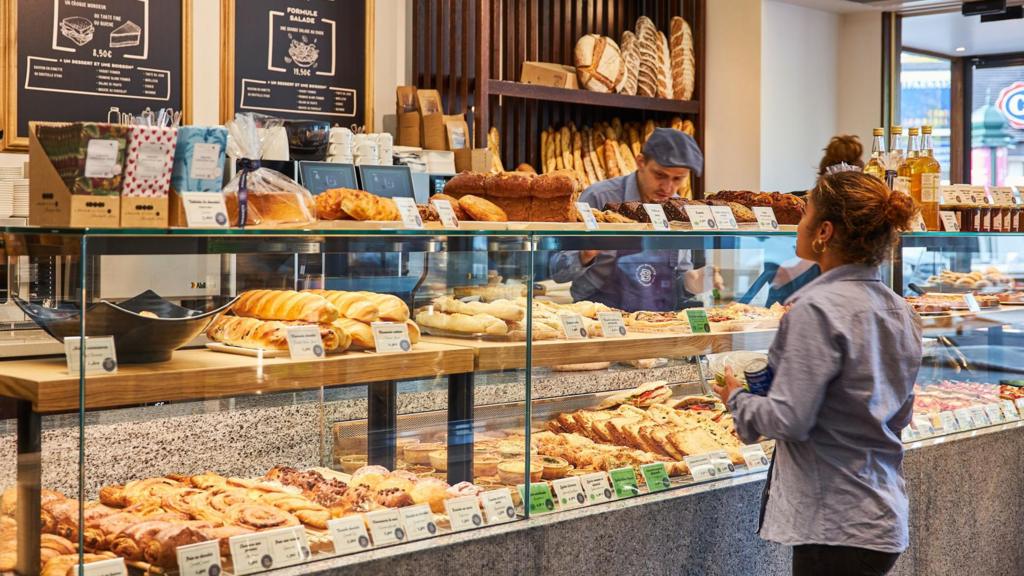Descend into the basement level of any major Singaporean shopping mall, and the aroma of freshly baked goods will likely greet you.
Long queues consistently form at Korean, Japanese, Taiwanese, and Singaporean bakeries. Customers, tongs in hand, carefully select from an array of cream rolls, milk breads, croissants, and pastries displayed in well-stocked cabinets.
Paris Baguette, despite its name suggesting a French origin, with its tricolore-inspired decor and Eiffel Tower signage aiming for a Parisian café ambiance, is wholly Korean.
“I wouldn’t limit our bread to solely French origins. We are a global brand,” clarifies Jin-soo Hur, President and CEO of SPC Group, Paris Baguette’s parent company. “Like croissants; are they European? I’d say they’re universal.”
SPC’s history traces back eighty years to a small family bakery. Now a major South Korean bread and pastry producer, it employs 20,000 people across its brands and reported $5.6 billion in sales last year.
Established in 1988, Paris Baguette was a pioneer, becoming the first Korean bakery brand to expand internationally, opening in China, a market that remains significant.
Currently boasting 4,000 stores across 14 countries, including locations in Asia, Europe, and the US, Paris Baguette plans ambitious overseas expansion, targeting over 1,000 new international branches by 2030, with a strong focus on the US market.
A substantial investment in a Texas factory, set for completion in 2027, will become its largest overseas production facility, supplying the US, Canada, and Latin America.
Mr. Hur prioritizes conquering the American market, viewing it as a testament to Paris Baguette’s global success. Strategic partnerships, such as the one with English Premier League club Tottenham Hotspur, play a key role in their expansion strategy.
A previous collaboration with Paris Saint-Germain further highlights this approach, providing match-day refreshments to fans. “Food is culture. Sports bring large crowds, and the atmosphere in London is always vibrant,” Mr. Hur notes.
While Son Heung-min, captain of both Tottenham and the South Korean national team, recently led Spurs to victory, Mr. Hur emphasizes that the partnership transcends nationality, viewing Tottenham as a “top club” and aligning Paris Baguette with similar aspirations.
Acknowledging the challenges of traditional dough production, Mr. Hur highlights the company’s system of delivering frozen dough to franchises globally, improving efficiency and extending shelf life.
Asia’s rich baking heritage, coupled with rapid urbanization and evolving lifestyles, fuels the growing demand for convenient on-the-go foods. Bakeries across the region offer a vast range of products, blending classic items like pain au chocolat with Asian-inspired flavors such as pandan, durian, salted egg, red bean, and matcha.
Paris Baguette caters to this demand through a halal-certified Malaysian facility, supplying Southeast Asia and the Middle East.
The global fascination with Korean culture presents a significant opportunity for Asian bakeries. Saverio Busato, a pastry chef at the Culinary Institute of America in Singapore, observes, “Korean and Japanese culture is so popular; people see it on screen and want to try it.” He notes the surprising presence of Asian bakeries even in Italy.
However, questions remain regarding the quality of frozen dough versus artisanal baking. A blind taste test with Chef Busato revealed shortcomings in a frozen croissant, lacking honeycomb structure and butter flavor.
Chef Busato acknowledges the limitations of mass production, yet finds a Korean milk bread exceptional, believing it would thrive in European markets.
The cost-of-living crisis, particularly US inflation, presents a significant challenge for Paris Baguette’s US expansion. Mr. Hur acknowledges the impact, referencing Pret A Manger’s struggles as an example of the industry’s current difficulties.
Despite these economic headwinds, Mr. Hur asserts that profit is not the sole objective. “If we only sought profit, we’d remain in Korea,” he states. “We aim to transform global bread culture and continue expanding—beneficial for our nation and consumers.”

